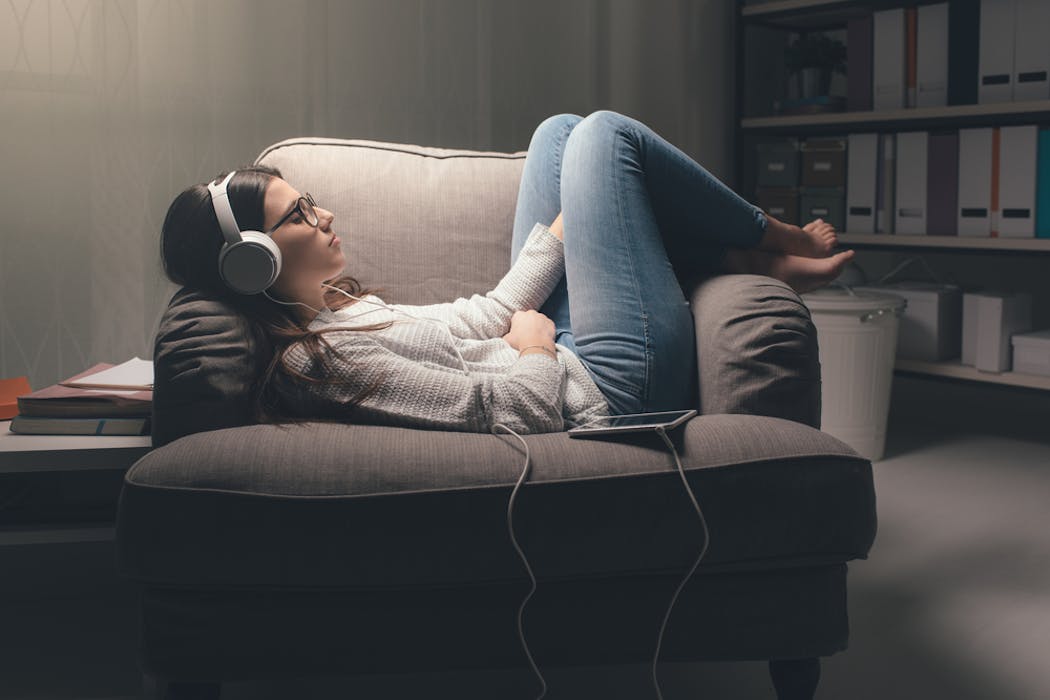Music has been used for centuries as a tool for relaxation and stress relief. The power of music to calm the mind and soothe the soul is undeniable. Whether it’s the gentle strumming of a guitar, the soft melodies of a piano, or the rhythmic beats of a drum, music has the ability to transport us to a place of peace and tranquility. The soothing sounds of music can help to slow down our breathing, lower our heart rate, and reduce muscle tension, all of which are key components of relaxation. In addition to its physical effects, music also has the power to evoke emotions and memories, which can further enhance its ability to relax and comfort us. Whether it’s a favorite song from our childhood or a new piece of music that resonates with us, the right music has the ability to transport us to a place of calm and serenity.
Understanding the Science Behind Music and Relaxation
The science behind music and relaxation is fascinating and complex. Research has shown that listening to music can have a profound impact on our physiological and psychological state. When we listen to music that we find enjoyable and soothing, our bodies release dopamine, a neurotransmitter that is associated with pleasure and reward. This release of dopamine can help to reduce stress and anxiety, and promote feelings of relaxation and well-being. In addition to its effects on our brain chemistry, music also has the ability to synchronize with our body’s natural rhythms, such as our heart rate and breathing patterns. When we listen to music with a slow and steady tempo, our bodies tend to naturally sync up with the rhythm, leading to a sense of calm and relaxation. Furthermore, music has been shown to activate the parasympathetic nervous system, which is responsible for promoting relaxation and reducing stress. All of these physiological responses to music help to explain why it is such a powerful tool for relaxation.
Creating the Perfect Relaxation Playlist
Creating the perfect relaxation playlist is a highly personal and individualized process. The key is to choose music that resonates with you on a deep level and helps you to feel calm and at ease. When creating your relaxation playlist, consider including a mix of different genres and styles of music, as well as both instrumental and vocal pieces. Instrumental music, such as classical or ambient music, can be particularly effective for relaxation, as it allows you to focus on the soothing sounds without being distracted by lyrics or vocals. However, if you find that certain songs or lyrics have a calming effect on you, feel free to include them in your playlist as well. It’s also important to consider the tempo and rhythm of the music you choose. For relaxation purposes, it’s generally best to choose music with a slow and steady tempo, as this can help to slow down your breathing and heart rate. Ultimately, the goal is to create a playlist that helps you to feel relaxed, calm, and at peace.
When creating your relaxation playlist, it’s important to consider the specific situations in which you plan to use it. For example, if you’re looking for music to help you unwind after a long day at work, you may want to include some gentle and soothing pieces that can help you to de-stress and relax. On the other hand, if you’re looking for music to help you fall asleep, you may want to include some softer and more ambient pieces that can help to lull you into a peaceful slumber. It’s also important to consider the length of your playlist. If you’re using your relaxation playlist for activities such as meditation or yoga, you may want to create a longer playlist that can provide continuous background music for an extended period of time. On the other hand, if you’re using your playlist for shorter relaxation sessions, such as taking a bath or reading a book, a shorter playlist may be more appropriate.
Using Music to Enhance Meditation and Mindfulness Practices
Music can be an incredibly powerful tool for enhancing meditation and mindfulness practices. When used in conjunction with these practices, music has the ability to deepen our sense of focus and presence, and help us to achieve a state of deep relaxation and inner peace. One of the key ways in which music can enhance meditation and mindfulness practices is by providing a point of focus for our attention. When we listen to music while meditating or practicing mindfulness, we can use the sounds as an anchor for our awareness, helping us to stay present in the moment and prevent our minds from wandering. In addition, certain types of music, such as ambient or nature sounds, can help to create a calming and peaceful atmosphere that is conducive to meditation and mindfulness.
Incorporating music into your meditation and mindfulness practices can also help to enhance the emotional and spiritual aspects of these practices. Music has the ability to evoke emotions and memories, which can help us to connect with our inner selves on a deeper level. Whether it’s the gentle strumming of a guitar or the ethereal sounds of a choir, music has the power to touch our hearts and souls in profound ways. By choosing music that resonates with us on a deep level, we can enhance our meditation and mindfulness practices by creating an atmosphere that is conducive to self-reflection, introspection, and spiritual growth.
Incorporating Music into Your Self-Care Routine
Incorporating music into your self-care routine can be an incredibly effective way to promote relaxation and well-being. Whether it’s taking a long bath while listening to soothing music, practicing yoga with calming background music, or simply taking a few moments to sit quietly and listen to your favorite songs, music has the ability to enhance your self-care practices in numerous ways. One of the key benefits of incorporating music into your self-care routine is its ability to help you relax and unwind after a long day. By taking some time each day to listen to calming music, you can create a peaceful and tranquil atmosphere that can help you to de-stress and recharge.
In addition to its ability to promote relaxation, music can also help to enhance your self-care routine by providing an outlet for self-expression and creativity. Whether it’s playing an instrument, singing along to your favorite songs, or simply dancing around your living room, engaging with music in a creative way can be incredibly therapeutic and uplifting. Music has the power to uplift our spirits, boost our mood, and provide an outlet for emotional expression. By incorporating music into your self-care routine in a creative way, you can tap into these benefits and enhance your overall sense of well-being.
Exploring Different Genres of Music for Relaxation
When it comes to using music for relaxation, there are countless genres and styles of music to explore. From classical and ambient music to jazz and world music, each genre has its own unique qualities that can help to promote relaxation and well-being in different ways. Classical music, for example, is known for its soothing melodies and gentle rhythms, making it an ideal choice for relaxation purposes. Pieces by composers such as Mozart, Beethoven, and Chopin are particularly popular choices for relaxation playlists due to their calming and tranquil nature.
Ambient music is another genre that is highly effective for relaxation purposes. Characterized by its atmospheric soundscapes and minimalistic compositions, ambient music has the ability to create a serene and peaceful atmosphere that is conducive to relaxation and meditation. Artists such as Brian Eno, Harold Budd, and Steve Roach are well-known for their contributions to the ambient music genre, creating beautiful soundscapes that can transport listeners to a place of calm and tranquility.
In addition to classical and ambient music, jazz is another genre that can be highly effective for relaxation purposes. With its smooth melodies and laid-back rhythms, jazz has the ability to create a mellow and soothing atmosphere that is perfect for unwinding after a long day. Artists such as Miles Davis, John Coltrane, and Bill Evans are known for their contributions to the world of jazz music, creating timeless pieces that are perfect for relaxation.
Tips for Incorporating Music into Your Daily Relaxation Routine
Incorporating music into your daily relaxation routine doesn’t have to be complicated or time-consuming. There are numerous simple ways in which you can use music to promote relaxation in your daily life. One of the easiest ways to incorporate music into your daily relaxation routine is by taking a few moments each day to simply sit quietly and listen to your favorite songs. Whether it’s first thing in the morning while enjoying a cup of coffee or in the evening before bed, taking some time each day to listen to calming music can help you relax and unwind.
Another simple way to incorporate music into your daily relaxation routine is by using it as background music during everyday activities such as cooking, cleaning, or working. By playing calming music in the background while going about your daily tasks, you can create a peaceful atmosphere that can help you stay relaxed and focused throughout the day.
If you’re looking for more structured ways to incorporate music into your daily relaxation routine, consider using it as part of activities such as yoga or meditation. Playing calming background music during these activities can help you stay focused and present in the moment while promoting relaxation and inner peace.
In conclusion, the power of music in relaxation cannot be overstated. Whether it’s through its ability to calm the mind and soothe the soul or its impact on our physiological and psychological state, music has the ability to transport us to a place of peace and tranquility like nothing else can. By understanding the science behind music and relaxation, creating the perfect relaxation playlist, using music to enhance meditation and mindfulness practices, incorporating it into your self-care routine, exploring different genres of music for relaxation, and following simple tips for incorporating it into your daily relaxation routine, you can harness the power of music in countless ways in order to promote relaxation in your daily life.
Find out how Torongo Therapyplus can help you with your needs. Get in touch with us at smile@torongo.life, or call us on 02 8809 9965.































